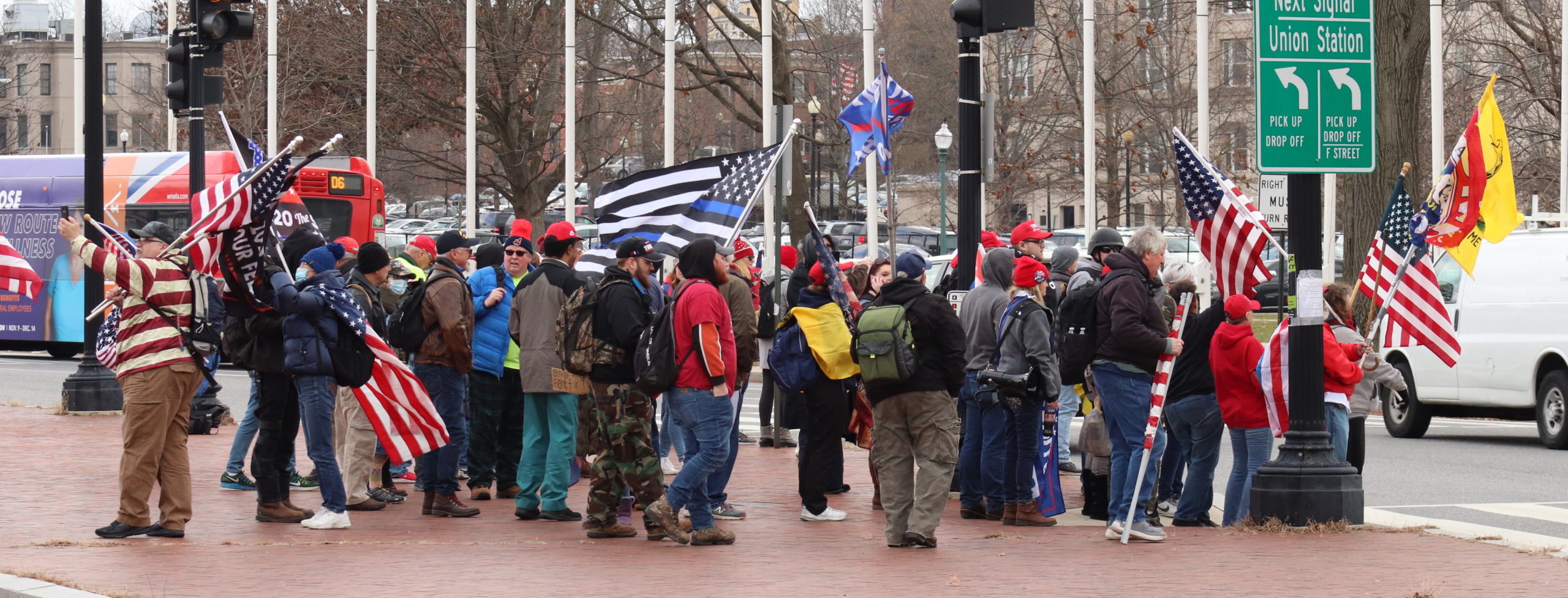
White Christian Nationalism at the Capitol
Caroline Mala Corbin
Trump Supporters, en route to US Capitol Grounds, at Union Station Columbus Circle and Delaware Avenue, NE, Washington DC on Wednesday morning, 6 January 2021 by Elvert Barnes. (CC BY-SA 2.0)
This article is part of our “Chaos at the Capitol: Law and Religion Perspectives on Democracy’s Dark Day” series.
If you’d like to check out other articles in this series, click here.
A noose. A confederate flag. A Latin cross. A Jesus 2020 banner. These were the symbols deployed by Trump supporters on January 6 at the nation’s Capitol. At first glance, they seem unrelated, and perhaps they are. Details are still coming in about the various groups who participated in the Trump insurrection. At the same time, their symbols, and support of Trump, may well be united by Christian nationalism.
The Christian Symbols
Christian nationalism is the belief that the United States “has been and should always be distinctively Christian in its identity, values, sacred symbols and policies.”1 Samuel L. Perry & Andrew L. Whitehead, Christian Nationalism and White Racial Boundaries: Examining Whites’ Opposition to Interracial Marriage, 38 Ethnic & Racial Stud. 1671, 1672 (2015). In the eyes of Christian nationalists, the United States is God’s chosen country, 2 Andrew L. Whitehead & Samuel L. Perry, A More Perfect Union? Christian Nationalism and Support for Same-Sex Unions, 58 Soc. Persp. 422, 425 (2015). and in order to stay in God’s favor, “the United States must uphold God’s commands and not break the covenant.”3Whitehead & Perry, Same-Sex Union, supra note 2, at 425. A failure to obey God’s laws — and by that Christian nationalists mean God’s laws as they understand them — will lead to great national harm.4Whitehead & Perry, Same-Sex Unions, supra note 2, at 423 (defining Christian nationalism as “the belief that (1) God chose the United States and (2) the United States must follow God’s commands to flourish”). Consequently, Christian nationalism requires a Christian government to ensure that the United States abides by Christian principles.
The Racist Symbols
Christian nationalism has a notable racial dimension, so that the mythical Christian America is actually a white Christian America. In other words, “Christian nation” is usually understood to mean “white Christian nation.”5Tara Isabella Burton, What One Pastor’s Anti-Nike Protest Says About Religion and Nationalism in America, VOX (Sept. 14, 2018, 12:50 PM) (quoting historian John Fea: “Christian nationalism has always been connected with whiteness. It has always been about [the idea of] America’s founding by white Christians.”).
This association has a long history. When American citizenship by naturalization was limited to white people, the courts used religion to help establish race. Christians were white; non-Christians were not.6John Tehranian, Note, Performing Whiteness: Naturalization Litigation and the Construction of Racial Identity in America, 109 Yale L.J. 817, 835 (2000). (“[A] petitioner could point to the assimilation of his ethnic group into the core Western European, Christian tradition as evidence of his whiteness.”).
“The racial and religious systems of domination defined by Whiteness and Christianity overlapped and became intertwined such that a group’s designation as an ‘inferior race’ was in part informed by its affiliation to an ‘inferior religion.’”7Nagwa Ibrahim, Comment, The Origins of Muslim Racialization in U.S. Law, 7 UCLA J. Islamic &Near Eastern L. 121, 124 (2008)
This association continues today, with hostility to racial and religious minorities as well as non-native Americans another key characteristic of Christian nationalists.8Evan Stewart, Penny Edgell & Jack Delehanty, The Politics of Religious Prejudice and Tolerance for Cultural Others, 59 Soc. Q. 17, 18 (2018); Allyson F. Shortle & Ronald Keith Gaddie, Religious Nationalism and Perceptions of Muslims and Islam, 8 Pol. & Religion 435, 451 (2015); Samuel L. Perry & Andrew L. Whitehead, Christian Nationalism and White Racial Boundaries: Examining Whites’ Opposition to Interracial Marriage, 38 Ethnic & Racial Stud.. 1671, 1672 (2015); Joshua T. Davis, Funding God’s Policies, Defending Whiteness: Christian Nationalism and Whites’ Attitudes Towards Racially-Coded Government Spending, 42 Ethnic & Racial Stud. 2123, 2137 (2019) (“Numerous studies show that white Christian nationalism is linked with overt indicators of white supremacy, including explicit xenophobia and racism.”). In other words, Christian nationalists have a “particular racialized understanding of national identity” that is centered on native-born, white, Christian Americans.9Andrew L. Whitehead & Samuel L. Perry, Taking America Back for God: Christian Nationalism in the United States 16 (2020). Not surprisingly, an overwhelming percentage of Christian nationalists today are white.10Perry & Whitehead, White Racial Boundaries, supra note 1, at 1685.
Moreover, sociologists have found that alignment with Christian nationalism is one of the best predictors of support for Donald Trump. “[T]he degree to which Americans embraced Christian nationalism significantly and strongly predicted their vote for Trump.”11Joseph O. Baker, Samuel L. Perry, and Andrew L. Whitehead, Keep American Christian (and White): Christian Nationalism, Fear of Ethnoracial Outsiders, and Intention to Vote for Donald Trump in the 2020 Election, 81 Soc. of Religion 272, 275 (2020). In fact, Christian nationalism predicted support for Trump more strongly than evangelicalism.12Whitehead & Perry, supra note 9, at 20; see also Dante J. Scala, The Skeptical Faithful: How Trump Gained Momentum Among Evangelicals 50 Presidential Stud. Q. 927 (2020) (noting that early in the 2016 campaign more devoted evangelicals supported Cruz, while the less religious evangelicals preferred Trump in part due to his Christian nationalist message).
Why Trump?
Trump has made no secret of directly appealing to Christian nationalists. During his 2016 campaign, Trump repeatedly argued that the Christian heritage of the United States was under attack, and that he was the person to protect it. At Oral Roberts University, for example, Trump said, “There is an assault on Christianity . . .There is an assault on everything we stand for, and we’re going to stop the assault.”13Gerardo Marti, Identity Politics and Evangelical Support: Trump’s White Christian Nationalism 214 in American Blindspot: Race, Class, Religion, and the Trump Presidency (2020). As President, Trump has used his authority to implement Christian nationalist policies, ranging from wishing people “Merry Christmas” rather than “Happy Holidays,” to filling the federal bench with religious conservatives.
Because what matters to Christian nationalists is public policy rather than personal morality, Trump’s character deficiencies do not matter 14Andrew L. Whitehead, Samuel L. Perry & Joseph O. Baker, Make America Christian Again: Christian Nationalism and Voting for Donald Trump in the 2016 Presidential Election, 79 Soc. Religion 147, 165 (2018); see also Marti, supra note 13, at 218 (“The most important issue for white evangelicals is not profession of beliefs but rather support for [their] policy initiatives.”). “Christian nationalism is focused on preserving a perceived Christian identity for America irrespective of the means by which such a project would be achieved.”15Whitehead, Perry, & Baker, Make America Christian Again, supra note 16, at 165. Thus, even someone like Trump may serve as God’s tool for restoring America’s Christian heritage. As Franklin Graham (son of Billy Graham) summarized, “I never said [Trump] was the best example of the faith. He defends the faith.”16Marti, supra note 13, , at 214.
Conclusion
As the authors of Taking America Back for God: Christian Nationalism in the United States explained, Christian nationalism “is as ethnic and political as it is religious.”17Whitehead & Perry, supra note 9, at 10. In sum, the intermixing of religious and racist symbols by Trump supporters may represent different ideologies —- or they may represent different aspects of Christian nationalism. ♦

Caroline Mala Corbin is Professor of Law and Dean’s Distinguished Scholar at the University of Miami School of Law. Her scholarship focuses on the First Amendment’s speech and religion clauses, particularly their intersection with equality issues. Her contribution is based on her essay, The Supreme Court’s Facilitation of White Christian Nationalism, 71 Ala. L. Rev. 833 (2020).
Recommended Citation
Mala Corbin, Caroline. “White Christian Nationalism at the Capitol.” Canopy Forum, January 12, 2021. https://canopyforum.org/2021/01/12/white-christian-nationalism-at-the-capitol/

